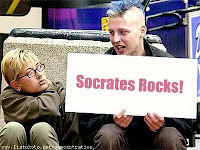 During Morpheus' interrogation, Agent Smith reveals to Morpheus why humans rejected the first version of the Matrix, the perfect version of it, 1.0:
During Morpheus' interrogation, Agent Smith reveals to Morpheus why humans rejected the first version of the Matrix, the perfect version of it, 1.0:"Did you know that the first Matrix was designed to be a perfect human world? Where none suffered, where everyone would be happy. It was a disaster. No one would accept the program. Entire crops were lost. Some believed we lacked the programming language to describe your perfect world. But I believe that, as a species, human beings define their reality through suffering and misery. The perfect world was a dream that your primitive cerebrum kept trying to wake up from, which is why the Matrix was redesigned to this: the peak of your civilization"1
In fact, Smith goes on to define humans as a virus that destroys anything and everything in its path; we spread across the planet like a plague and annihilate everything.

"I'd like to share a revelation that I've had during my time here. It came to me when I tried to classify your species and I realized that you're not actually mammals. Every mammal on this planet instinctively develops a natural equilibrium with the surrounding environment but you humans do not. You move to an area and you multiply and multiply until every natural resource is consumed and the only way you can survive is to spread to another area. There is another organism on this planet that follows the same pattern. Do you know what it is? A virus. Human beings are a disease, a cancer of this planet. You're a plague and we are the cure" 1
Kind of a bleak outlook on humanity, but what would you expect from a computer / artificial intelligence who had been trying to destroy our kind for 200 years? But, ironically, these thoughts didn't come from a computer but the minds of the Warshawsky Bros. who wrote the script.
However, using the phrase, "mankind is like a virus on the planet" to search Google, I discovered several interesting articles including one from a "Save the Whales" activist who feels that mankind is killing its host, the Earth and that we need to reduce our population to around one billion 2. The right-wing article doesn't really do the original article justice so I included a link to the original -http://www.seashepherd.org/news-and-media/editorial-070504-1.html , but apparently, the extinction event is just one in a cycle of extinction events - we are in the 6th extinction cycle! And this whole current cycle began 50,000 years when:
"a relatively hairless primate stumbled out of equatorial Africa and began wiping out the megafauna of the time. Wherever this creature (our ancestor) went, their arrival was followed by large die-outs of megafauna. Primitive hominids were well-organized, efficient, slaughter crews. As they advanced, the mammoth, sabre-toothed cats, cave bears, giant sloths, camels, horses, and wholly rhinos fell to their stone weapons and deliberately set fires. The extinction of all of these great mega-species is directly attributable to "primitive" human hunters. The hunting down of the mega-fauna was followed by the advent of agriculture and the domestication of selected animals. Domesticated cows, goats, sheep, and pigs grew in numbers and denuded large areas of grasslands. Irrigation systems began to toxify land. Then agriculture was followed by industrial activities, and finally, by the burning off of vast amounts of fossil fuels." 3
So.
Maybe we'll all be better off if we turn our cities and suburbs into Amish colonies with the horse-drawn carriages and little to no electricity. Or some of these of these people are over-reacting. Or both?
Question: Does mankind act like a virus in the way we consume resources and destroy our living space? Why or why not?
Due Wednesday, January 6. 200 words minimum.
Sources:
1. Internet Movie Database - http://www.imdb.com/title/tt0133093/quotes
2. Business and Media Institute - http://www.businessandmedia.org/articles/2007/20070506180903.aspx
3. Sea Shepherd Editorial 2007 - http://www.seashepherd.org/news-and-media/editorial-070504-1.html
A little music to make the blog go easier: Shinedown's "Devour" - http://www.youtube.com/watch?v=0QXNtLaOnSE plus the lyrics for the song:
Take it and take it and take it and take it and take it all
Take it and take it and take it until you take us all
Smash it and crash it and thrash it and trash it
You know they're only toys
Try it you'll like it don't hide it don't fight it, just let it out
Steal and shoot it and kill it or take another route
Take it and take it and take it
You know they're only toys
Devour Devour
Suffocate your own empire
Devour Devour
It's your final hour
Devour Devour
Stolen like a foreign soul
Devour Devour
What a way to go
You want it, you want it, you want it, you want it
Well here it is
Everything everything everything
Isn't so primitive
Take it and take it and take it and take it and take it all
Nobody nobody wants to feel like this
Nobody nobody wants to live like this
Nobody nobody wants a war like this
Devour Devour
Suffocate your own empire
Devour Devour
It's your final hour
Devour Devour
Stolen like a foreign soul
Devour Devour
What a way to go
What a way to go
 We read the articles by Emily Wilson with her alternative take on the life of Socrates. In "What's Wrong with Socrates?"in The Philosophers' Magazine, 2nd Qtr., 2008, she listed 10 things that conflicted with the myth/legend of Socrates that we have grown familiar with.
We read the articles by Emily Wilson with her alternative take on the life of Socrates. In "What's Wrong with Socrates?"in The Philosophers' Magazine, 2nd Qtr., 2008, she listed 10 things that conflicted with the myth/legend of Socrates that we have grown familiar with.